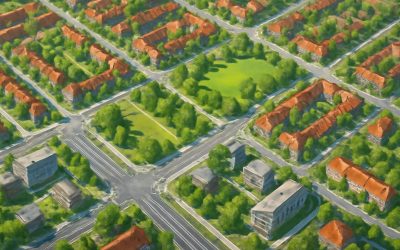
Town planning is the process of designing the physical layout and arranging infrastructure such as streets, roads, public buildings and parks to ensure an area meets its economic and social needs. It also involves ensuring that development complies with environmental and conservation requirements. Town planners work on a macro and micro scale, creating whole new towns and cities or making changes to existing ones. At the micro level this can include determining where local homes, shops and workplaces can be built, as well as other infrastructure like schools and hospitals.
In its earliest forms, town planning focused on ensuring urban areas had enough space for housing, commercial and industrial development and transportation, with the right proportion of open spaces. This was essential to maintain a healthy environment, avoid overcrowding and provide adequate sanitation. It was also important to plan for emergency procedures, such as fires and floods. The profession of town planning developed into a more sophisticated, technical practice in the 1800s as a result of industrialisation and rapid population growth which had a profound effect on living standards. It took on broader social ideals, such as those promoted by social reformers, who proposed solutions ranging from improving public health to building utopian communities.
A modern town plan outlines the overall development strategy for a town or city and must be approved by a local referendum or legislative body (Selectboards for most towns). It can be based on a number of factors including demographic, economic, environmental and transport data. Ideally, a town plan will be a collaborative effort and involve extensive community input.
To become a town planner, you need to have a degree with an appropriate focus. Prospects suggests that a background in surveying, architecture or construction is beneficial. You will also need a qualification accredited by the Royal Town Planning Institute in order to gain chartered status, which opens up more opportunities and allows you to earn higher salaries. In addition, you will need to comply with a code of conduct and professional indemnity insurance. This will help you to develop your career and protect yourself from unforeseen events. To find out more, visit the RTPI website.



0 Comments